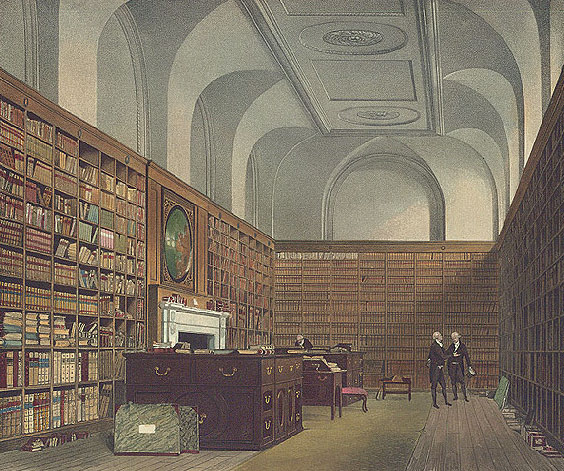LWON is celebrating the holidays by re-running some of our favorite posts. This post originally appeared in July 2012.
 Alarmist reporting about addictions to sex, to the internet or to exercise can suggest that new syndromes are being invented every day, that human existence is pathologized out of proportion. But some compulsive behaviors that caused concern centuries ago continue to affect people today, and the sufferers have trouble getting anyone to take their problems seriously.
Alarmist reporting about addictions to sex, to the internet or to exercise can suggest that new syndromes are being invented every day, that human existence is pathologized out of proportion. But some compulsive behaviors that caused concern centuries ago continue to affect people today, and the sufferers have trouble getting anyone to take their problems seriously.
Men and women book readers, who get up in the morning and go to bed in the evening with a book in their hand, who sit down at the table with it, who put it next to them at work, carry it with them on walks, and who cannot separate themselves from it, until they have finished reading it. But they have hardly devoured the last page of a book, they are already greedily eyeing up, where they might get the next one from […] and devour it with a voracious appetite. No smoker, coffee-friend, wine-drinker, gambler could be so addicted to their pipe, bottle, games or coffee table than many a book-hungry reader is to his reading.
In 1795 Germany, the vicar and schoolmaster Rudolf Gottlieb Beyer described me in perfect detail – me and many others I’ve known who make words or knowledge their business. The vice of novel-drinking (especially when practiced by women) was seen as undermining ones character, but perhaps not entirely because of the corrupting content of those books.
Never mind that this now constitutes a societally approved behavior, if only tacitly, and even in immoderation. In fact, “reading addiction” is something often admitted to as a kind of back-handed self-congratulation, with all the associated concern or likelihood of community intervention as that of a self-proclaimed “politics junkie”.
Addiction is characterized by impaired control over the behavior, preoccupation with it, continued use despite negative consequences, and denial. In the absence of opportunities to express it, there emerges anxiety, irritability and intense cravings.
But it is also an off-shoot of our capacity for learning and memory. To cure addiction entirely is to break associations, to forget the reward paired with a behavior. As long as our species has the capacity to learn, we will be dealing with addictions. Not surprising, then, that people who love to learn may also be prone to some learning-related addictions.
Anything that gets the dopamine flowing is likely to be repeated for another dose of immediate gratification. This is only problematic when there are delayed deleterious effects. As with most psychiatric measures, nothing is really a problem – not even compulsive behavior – unless it is negatively impacting the rest of your life, your ability to work and to love. But with something like reading, the delayed effects are complex and of mixed valence. Reading is part of many people’s job descriptions. It’s integrated inescapably into modern life. To quit is like taking a vow of silence and deafness.
 A reading addiction is not to be confused with bibliomania, the manic amassing of books, which is a symptom of obsessive-compulsive disorder. Rather, reading becomes a problem when it’s a way of avoiding facing life or oneself: an escape mechanism. But what interests me is its extension: an addiction to processing language, having ones thoughts dictated by external direction, inhabiting the mind of another instead of one’s own.
A reading addiction is not to be confused with bibliomania, the manic amassing of books, which is a symptom of obsessive-compulsive disorder. Rather, reading becomes a problem when it’s a way of avoiding facing life or oneself: an escape mechanism. But what interests me is its extension: an addiction to processing language, having ones thoughts dictated by external direction, inhabiting the mind of another instead of one’s own.
An obsession with consuming the printed word blends seamlessly with being hooked on the challenge of new thoughts and ideas. We are drawn to the intellectual exertion, something akin to a mental exercise addiction. The Gutenberg press’ effect was to make reading a consumptive activity, and as books became less expensive, reading styles changed. Books were to circulate, to be used and completed, not to be prized and reread and memorized. The speed of reading accelerated to the point where there was concern about the “tearing of mental fibres” from all that mental strain. Reading was to be for some, including me, as compulsive as consumerism itself.
As media evolves, so does the form of addiction, and internet addictions are merely one of the new guises of this media consumption frenzy. The 18th century writer and clergyman Sydney Smith read four books at a time to avoid the gloom that proceeds from hanging a long while over a single book – ADD-style reading, a kind of proto-net-surfing.
For me, it comes in waves, maybe a month on, a month off – I haven’t tracked it, but maybe I will now. I read my magazines cover to cover, for the satisfaction of having somehow “completed” them at the end and am only able then to throw them out. Some people are this way with newspapers, but I know if I started on any kind of daily publication, it would absolutely kill me. The many and various books I have read have contributed to an inner life and given me a career. But they have also consumed months of every year, side tracked me from school and work, kept me home when I should have been out. As addictions go, I’d pick it over many others, but it’s a problem.
Images: Wikimedia Commons

I like so much about this post, including the Rudolf Gottlieb Beyer quote, the beautiful pictures, and the way you describe so many people I know and someone I think I might be: “hooked on the challenge of new thoughts…something akin to a mental exercise addiction.” I’ve heard a lot about the runner’s high (“You’re addicted to it, Meagan!”) And over the years, hearing about that so often has made me forget I might be hooked in a really consuming way on anything else, like books (or ideas, or news). I definitely experience a similar high from reading/reading about those three….Thoughtful post!
Lovely, Jessa … I was a happy fellow sufferer, but post-kid I’ve replaced it with a kind of optimistic bibliomania … I buy books and fantasize about having time to read them. Can you organize a reverse intervention, and tell me how you keep your addiction going?
Thanks Meagan! And Michelle, I really think we need an It Gets Better campaign for new parents. Time will never fully restore your free time, but you will read again, my friend.
This captures it perfectly. Oh, dear.
Michelle, my first born nursed for 9 hours a day at one point in his tiny youth. I spent all that time reading…
Great post, I’ll admit I have a problem, isn’t that the first step?
Okay, I’ve read constantly, every chance I got since starting school, but I earned a doctoral degree, ran a professional office for 35+ years, raised two children (both reading addicted adults,) so don’t really consider this to be a problem. Admittedly, it may help that my husband is also reading addicted. And, yes, my house is messy, my yard as well, but I’d still rather read than do just about anything else. My sins may be scarlet, but my books are read! And I’m perfectly happy with that situation. CEG
If I have a problem, GOOD FOR ME! Great article, thanks
Does anyone else think that reading saved their life?
And, how many of you out there can recite the entire ADA endorsement of Crest toothpaste? Because we read anything, repeatedly, rather than sitting there empty-handed…
Yes, in some sense, reading did save my life. And I do read compulsively but luckily, have very little memory for toothaste disclaimers.’